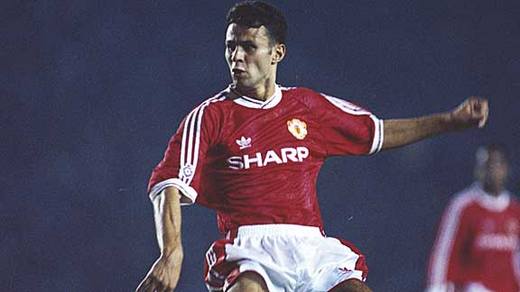News
Giggs will soon tear you apart

Wednesday, March 2, marks 20 years of Ryan Giggs as a Manchester United first-team player. It is the anniversary of an inauspicious 2-0 home defeat to Everton in which a 17-year-old Giggs replaced a hamstrung Denis Irwin after Everton's first goal to make his debut.
Two decades at the top makes Ryan Giggs a freak of the modern game. Even when casting back through the English game's history, there are none whose careers have lasted so long at such a high level. Sir Stanley Matthews may have been playing at 50 but was not a stranger to the Second Division.
At Manchester United, Giggs is already by far the longest-serving player in the club's history. Munich survivors Bill Foulkes and Bobby Charlton both played just under 17 years for the club while Billy Meredith, United's first "Welsh Wizard", may have played for fully 30 years from 1894 to 1924, but spent much of that time in the colours of Manchester City. Giggs has remained a singular player in the English game, and is similarly admired across Europe too. He thanks an inherited physiology and the right advice for a longevity that is enhanced in focus by casting back the mind to the club whose first-team he first lined up for on March 2, 1991. Giggs and Alex Ferguson, as he was then, may remain, but Manchester United is a very different beast indeed. Indeed, March 1991 was a time when the club were preparing to float on the Stock Exchange and were majority-owned by a local clan in the Edwards family, formerly involved in the butchery business.
An Everton victory at Old Trafford may be a rare thing these days, but was not unusual at a time when the Toffees had been champions as recently as 1987. United's last title had come way back in 1967. On the Wednesday before this Saturday 3pm kick-off, quaint in itself, Everton had dumped a newly Dalglish-less Liverpool from the FA Cup while both teams had given up on title ambitions long before they met here. Everton continued a revival under the returned Howard Kendall with goals from Pat Nevin and Dave Watson and such a result barely served as a surprise. The significance of this occasion would take some time to be recognised.
This Manchester United vintage had their mind on other things. Like now, they had European ambitions, though that was an unfamiliarity in itself. The summer of 1990 had seen the end of the five-year European competition ban imposed after the Heysel Stadium Disaster at the 1985 European Cup final.
Champions Liverpool's ban was extended for a season for their fans' behaviour at Heysel, so along with Aston Villa, who had finished runners-up, United were once again English pioneers in Europe, competing in the now-defunct European Cup Winners' Cup. May of 1990 had seen them end a five-year trophy drought with the FA Cup, a goal from Lee Martin winning a replayed final against Crystal Palace.
After an encounter with hairy Hungarians Pecsi Munkas and the local glamour of a trip to Welsh Cup holders Wrexham, the following Wednesday would see Montpellier welcomed to Manchester. A French outfit who boasted Carlos Valderrama and Laurent Blanc in their ranks, La Paillade lay in wait in the quarter-finals, and the Everton match saw coach Henry Casperczak watching from Old Trafford's Main Stand as United lost their first home game since October.
The exotica of the French club's continental stars was not matched by Manchester United on this particular afternoon, and nor could it be. United was a club without European influence. As they would do until the late-season addition of Russian Andrei Kanchelskis, they lined up with an all-British Isles starting XI, with Irwin, Northern Ireland's Mal Donaghy, Scotland's Brian McClair and Darren Ferguson plus Wales' Clayton Blackmore providing as foreign an edge as could then be offered. It would take Kanchelskis' arrival and the summer purchase of Peter Schmeichel to move the club on the road to the league of nations it currently represents. That enforced isolation from the continent, and the failure of players like Jesper Olsen and Nikola Jovanovic to impose themselves at Old Trafford had served to keep them parochial, though Eric Cantona, a former Montpellier man, would alter the culture forever the following year.
United's true stars at the time were Bryan Robson and Mark Hughes, and both were returning from injury and were not risked here. By this time, the former's match-winning influence had been lessened by the regularity of his absences and he was replaced here by Darren Ferguson, the manager's son making his first start for his dad's team. That Giggs went unnoticed and unheralded by many on that muddy afternoon reflected the fact that Ferguson Snr had made use of several youth players in recent years and many of them had been and gone in very little time indeed.
Some had lasted and made an impact: Martin, Hughes and Blackmore were products of The Cliff, an arcane training facility in Salford eventually replaced by the hi-tech modernity of Carrington in 2000. But sat on the bench alongside Giggs was Russell Beardsmore, a wiry and bucktoothed midfielder who had arrived in the first team as a member of an early and largely ill-fated group of "Fergie Fledglings". That group, named in deference to the famous "Busby Babes" had enjoyed a flush of success when Liverpool had been beaten on New Year's Day 1989 but players like Beardsmore, David Wilson, Mark Robins and Deiniol Graham were eventually forced to seek first-team football elsewhere while Tony Gill's career had been ended by injury.
The Observer's Patrick Barclay had obviously received advanced notices from his Old Trafford snouts, describing Giggs as "a wiry 17-year-old recently given a five-year contract and the most talked-about prospect at Old Trafford since [Norman] Whiteside". And indeed, there had been quite some buzz about Giggs, or Ryan Wilson as he was initially known until a name change to reflect his loyalty to his mother in the face of his parents' divorce.
"I shall always remember my first sight of him, floating over the pitch at The Cliff so effortlessly that you would have sworn his feet weren't touching the ground," said Ferguson in his autobiography of his initial encountering of the 14-year-old Wilson. "He carried his head high and he looked as relaxed and natural on the park as a dog chasing a piece of silver paper in the wind. From that moment on, we protected Ryan like the treasure he was."
Long before that Everton bow, Charlton, the man he would eventually surpass, was already a confirmed fan as was youth coach Brian Kidd, the softly-spoken Mancunian serving as a mentor for Giggs and his contemporaries at that time. Meanwhile, Giggs' eventual position of left winger had an incumbent, another flushed with youth, though one bought in from Torquay at 17 in late 1988. This had been 19-year-old Lee Sharpe's breakthrough season, a League Cup hat-trick at Arsenal, runaway champions that year, and a series of pacy dissolutions of right-backs had caused him to be viewed by fans and team-mates as their prime attacking weapon. On this occasion, Barclay's view from the press box was that "United's only obvious tactic (was) that of getting the ball to their left winger as often as possible (which) foundered on his inability to get over a single decent cross".
After Irwin limped off, Giggs' arrival came earlier than expected and a reshuffle had him playing in an advanced position off McClair, but this was no wonder debut in the style that Cristiano Ronaldo or Wayne Rooney would both later produce. In Barclay's view, Giggs "failed to find his feet until well into the second half when the Stretford End were encouraged by a superb cross".
That part of Old Trafford would soon become acquainted with such a sight, though Giggs would have to wait until the following season to bed in and become part of the furniture at what has since become English's football's most potent winning machine. Twenty years on, few could dispute his status among United's greatest ever players.
"Looking back now," Ferguson wrote, "I feel I can honestly say that whatever United have paid me in my 13 years at Old Trafford was justified at a stroke by securing Ryan." And that was a statement delivered way back in 1999.
What happened next? United would squeeze past Montpellier in the Cup Winners' Cup after a home draw, and eventually beat Barcelona in a rain-drenched but still cherished final in Rotterdam. They also lost the League Cup final to Sheffield Wednesday and finished sixth in the Football League, a place behind Manchester City - the last time that occurred. The following season saw Giggs become a first-team regular, to the displacement of Sharpe, who began to suffer the injuries and distractions that eventually halted his development. United, however, blew their title challenge in 1991-92 in a disastrous 11-day period before finally breaking the hoodoo with the first Premier League title the following May. Giggs eventually surpassed Charlton's United appearance record of 759 matches when coming on as a sub in the 2008 Champions League final. Having signed a new contract last month, Giggs will be a United player at least until the summer of 2012.


